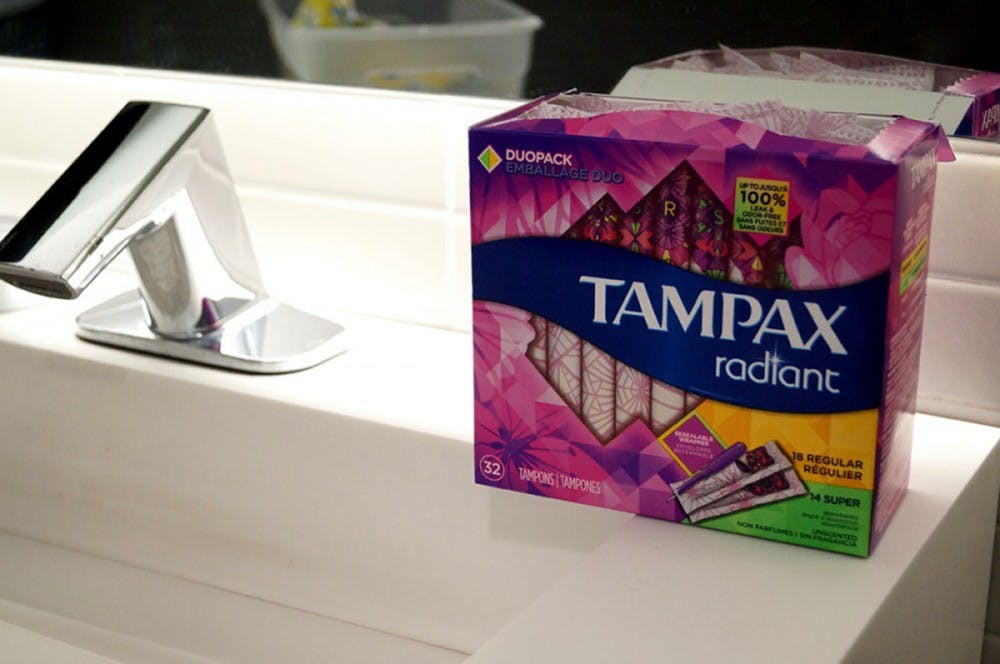Student Council announced on Thursday the continuation of the pilot program providing free menstrual hygiene products in certain, high-traffic areas around Grounds, including 1515, Newcomb Hall and Nau and Gibson Halls. This announcement came only one day after Gov. Ralph Northam signed a bill to decrease sales tax on feminine hygiene products. Given the extent they each have addressed the problems of gender discrimination associated with menstrual hygiene products, Student Council has been more successful than the Commonwealth in participating in a positive national trend seeking to increase both accessibility and awareness of menstrual health.
Council’s initiative began almost a year ago as part of a cooperative effort with the Inter-Sorority Council, where both groups organized and ran trials to determine the demand for menstrual hygiene products in high-traffic areas around Grounds. This trial run follows programs at other universities, including at James Madison University and Brown University.
At the state level, Virginia’s law is only a half-measure of success. The “tampon tax” term is a slight misnomer, as no states have laws directly targeting taxes at feminine hygiene products, but instead, many states do not list feminine hygiene products on the list of necessities, such as food and prescription medications — including Viagra — exempt from sales tax. As of November, ten U.S. states have passed bills adding feminine hygiene products to the list of exempted products, while five others states do not have sales tax.
As advocates who call these policies part of “period equity” point out, these laws are a commonsense measure to address obvious discrimination. Menstruation is not a choice in the lives of those with female bodies, yet the products required to deal with menstruation are not considered necessities while performance-enhancing medications for men are. This discrepancy is obviously unfair and discriminatory in the way it takes advantage of women’s necessary bodily functions for the state’s profit.
Virginia’s law was initially introduced as a complete elimination of sales tax on menstrual hygiene products by former Delegate and current Senator Jennifer Boysko (D-Fairfax), but altered to a cut of the sales tax to only 2.5 percent to match a bill introduced by Del. Kathy Byron (R-Bedford). While only a partial reduction in tax costs does not address the discrimination at issue in this discussion, it does lessen the effects of that discrimination to some extent. The Virginia legislature and Northam have at least done a better job addressing it than California’s former governor Jerry Brown, who vetoed a bill that had unanimously passed the California legislature eliminating the tampon tax in 2016 because of the $20 million loss to state revenue that would have occurred as a result. While budgetary issues are certainly a worthy concern for the governor and the legislature, particularly in states with large budget deficits like California, the solution to budgetary crisis cannot be profiting off of legal discrimination against half of the population of the state.
Student Council’s initiatives, if carried past the trial period, will better address this example of gender discrimination than the Virginia state legislature’s recent half-measure. To fully address and end the gender discrimination inherent in the current policy, the legislature must end the sales tax on feminine hygiene products because a lower discriminatory tax is still a discriminatory tax. By contrast, providing free menstrual hygiene products in relevant locations around Grounds matches other health initiatives provided by the University, which supplies other products such as condoms for free. Just as it is fitting and appropriate that the University distributes condoms, it is equally appropriate — and resolves issues of gender discrimination — to provide free menstrual hygiene products.
As I recently wrote, issues affecting women should be more widely discussed and publicized, so our society can work to solve problems affecting half our population. Menstrual health continues to be a topic of stigma and shame across the world despite its natural role in the health of women’s bodies. Education and initiatives increasing access to this healthcare both fight this stigma and support women’s fight for equal access to healthcare. Council’s initiative should continue to be supported, promoting menstrual health in the same way as sexual health in the University community. Virginia lawmakers need to follow the example of students and privilege menstrual health in the same ways they privilege other health necessities to ensure equality for women and women’s health issues.
Katherine Viti is a Viewpoint Writer for The Cavalier Daily. She can be reached at opinion@cavalierdaily.com.







